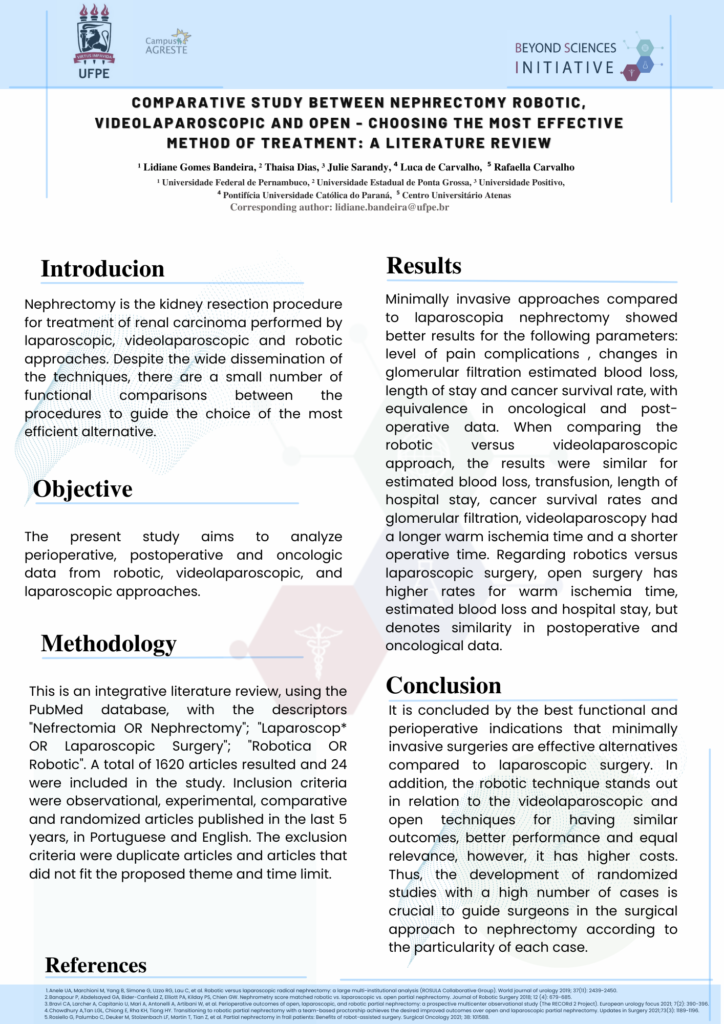Lidiane G Bandeira
Conference 2023 Presentation
Project title
Comparative study between nephrectomy robotic, videolaparoscopic and open – Choosing the most effective method of treatment: a Literature Review
Authors and Affiliations
Lidiane Gomes1, Thaisa Dias2, Julie Sarandy3, Luca De Carvalho4, Rafaella Ferreira5
1. Universidade Federal de Pernambuco- Campus Agreste (UFPE), Caruaru- PE, Brazil 2. Universidade Estadual de Ponta Grossa – Campus Uvaranas (UEPG), Ponta Grossa – PR, Brazil 3. Universidade Positivo – Curitiba – PR, Brazil 4. Pontifícia Universidade Católica do Paraná – PR, Brazil 5. Centro Universitário Atenas- Paracatu-MG, Brazil
Abstract
Background
Nephrectomy is the kidney resection procedure for treatment of renal carcinoma performed by laparoscopic, videolaparoscopic and robotic approaches. Despite the wide dissemination of the techniques, there are a small number of functional comparisons between the procedures to guide the choice of the most efficient alternative. The present study aims to analyze perioperative, postoperative and oncologic data from robotic, videolaparoscopic, and laparoscopic approaches.
Methods
This is an integrative literature review, using the PubMed database, with the descriptors “Nefrectomia OR Nephrectomy”; “Laparoscop* OR Laparoscopic Surgery”; “Robotica OR Robotic”. A total of 1620 articles resulted and 24 were included in the study. Inclusion criteria were observational, experimental, comparative and randomized articles published in the last 5 years, in Portuguese and English. The exclusion criteria were duplicate articles and articles that did not fit the proposed theme and time limit.
Results
Minimally invasive approaches compared to laparoscopia nephrectomy showed better results for the following parameters: level of pain, complications, changes in glomerular filtration, estimated blood loss, length of stay and cancer survival rate, with equivalence in oncological and post-operative data. When comparing the robotic versus videolaparoscopic approach, the results were similar for estimated blood loss, transfusion, length of hospital stay, cancer survival rates and glomerular filtration, videolaparoscopy had a longer warm ischemia time and a shorter operative time. Regarding robotics versus laparoscopic surgery, open surgery has higher rates for warm ischemia time, estimated blood loss and hospital stay, but denotes similarity in postoperative and oncological data.
Conclusions
It is concluded by the best functional and perioperative indications that minimally invasive surgeries are effective alternatives compared to laparoscopic surgery. In addition, the robotic technique stands out in relation to the videolaparoscopic and open techniques for having similar outcomes, better performance and equal relevance, however, it has higher costs. Thus, the development of randomized studies with a high number of cases is crucial to guide surgeons in the surgical approach to nephrectomy according to the particularity of each case.

